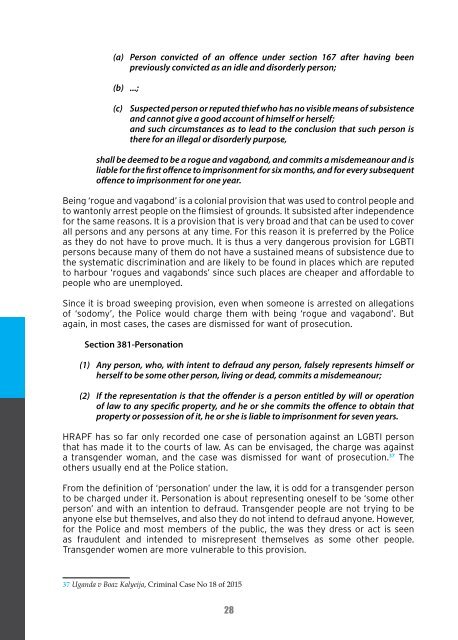PERSONS IN UGANDA
4Tks5WfQb
4Tks5WfQb
Create successful ePaper yourself
Turn your PDF publications into a flip-book with our unique Google optimized e-Paper software.
(a) Person convicted of an offence under section 167 after having been<br />
previously convicted as an idle and disorderly person;<br />
(b) ...;<br />
(c)<br />
Suspected person or reputed thief who has no visible means of subsistence<br />
and cannot give a good account of himself or herself;<br />
and such circumstances as to lead to the conclusion that such person is<br />
there for an illegal or disorderly purpose,<br />
shall be deemed to be a rogue and vagabond, and commits a misdemeanour and is<br />
liable for the first offence to imprisonment for six months, and for every subsequent<br />
offence to imprisonment for one year.<br />
Being ‘rogue and vagabond’ is a colonial provision that was used to control people and<br />
to wantonly arrest people on the flimsiest of grounds. It subsisted after independence<br />
for the same reasons. It is a provision that is very broad and that can be used to cover<br />
all persons and any persons at any time. For this reason it is preferred by the Police<br />
as they do not have to prove much. It is thus a very dangerous provision for LGBTI<br />
persons because many of them do not have a sustained means of subsistence due to<br />
the systematic discrimination and are likely to be found in places which are reputed<br />
to harbour ‘rogues and vagabonds’ since such places are cheaper and affordable to<br />
people who are unemployed.<br />
Since it is broad sweeping provision, even when someone is arrested on allegations<br />
of ‘sodomy’, the Police would charge them with being ‘rogue and vagabond’. But<br />
again, in most cases, the cases are dismissed for want of prosecution.<br />
Section 381-Personation<br />
(1) Any person, who, with intent to defraud any person, falsely represents himself or<br />
herself to be some other person, living or dead, commits a misdemeanour;<br />
(2) If the representation is that the offender is a person entitled by will or operation<br />
of law to any specific property, and he or she commits the offence to obtain that<br />
property or possession of it, he or she is liable to imprisonment for seven years.<br />
HRAPF has so far only recorded one case of personation against an LGBTI person<br />
that has made it to the courts of law. As can be envisaged, the charge was against<br />
a transgender woman, and the case was dismissed for want of prosecution. 37 The<br />
others usually end at the Police station.<br />
From the definition of ‘personation’ under the law, it is odd for a transgender person<br />
to be charged under it. Personation is about representing oneself to be ‘some other<br />
person’ and with an intention to defraud. Transgender people are not trying to be<br />
anyone else but themselves, and also they do not intend to defraud anyone. However,<br />
for the Police and most members of the public, the was they dress or act is seen<br />
as fraudulent and intended to misrepresent themselves as some other people.<br />
Transgender women are more vulnerable to this provision.<br />
37 Uganda v Boaz Kalyeija, Criminal Case No 18 of 2015<br />
28


